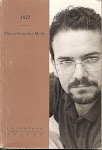Synopsis
1822 is a political satire on the consummation of the Mexican Independence. Its main aim is presenting the different points of view sustained by the protagonists of this historical period as they imagined or invented the future of their new country. After achieving emancipation from the colonial yoke, the politicians decided to crown a new emperor (Agustin the 1st) and then opted for the creation of a republican form of government, only to end up consolidating the tyranny that has characterized the major part of our independent life.
These sharp changes of opinion reflect both the fragile convictions of our Leaders and the need at that time to reinvent a collective national identity. Today, as Mexico is going through a similar stage in its history, we are lacking the audacity and imagination of a humanist like Servando Teresa de Mier (protagonist of the satire 1822) to discuss with what the future of Mexico should be.
This is a comedy that intends to communicate these ideas in an interesting and amusing fashion, using humor as a critical to confront the spectator, and humanizes history demonstrating that great personages can often be accused of the same follies committed by the common people.
On the play:
Aaron Mack Schloff:
Those searching for something “authentically Mexican” in subject matter might investigate large-scale shows like [...] the González Mello–written, Castro-directed 1822, Year We Were an Empire, in which a gadfly priest faces off against a power-hungry president-cum-emperor at the dawn of Mexico’s independence.
American Theatre Magazine, january 2004.
About the play
A play in two acts
Cast:
11 actors.
Lenght:
2 hours and 40 minutes (including one intermission).
Opening:
May 16, 2002
Juan Ruiz de Alarcón Theatre at the
National University of Mexico (UNAM).
Mexico City.
Opening season:
Over 420 performances of the play
(3 years on stage, more than 120,000 tickets sold)
Opening cast:
Priest Mier: Héctor Ortega
Agustín de Iturbide: Mario Iván Martínez
Guadalupe Victoria / Membrete: Hernán del Riego
Antonio López de Santa Anna: Martín Altomaro
Miguel Ramos Arizpe: Emilio Ebergenyi
Vicente Guerrero / Torrejas /
Comerciante / Guía:
Mario Zaragoza
Valentín Gómez Farías: Juan Sahagún
José G. Dávila / Ujier del Congreso /
Orfebre / Nicolás Bravo / Fraile Dominico:
Humberto Solórzano
Pío Marcha / De la Lagaña: Eugenio Lobo
Sargento / Secretario del Congreso /
Caballero / Comerciante :
Sergio López
Soldado / Corchea / Goyo /
Caballero / Indio / Benesky:
Alain Kerriou
Original score by Eduardo Gamboa
Designed by Mónica Raya
Directed by Antonio Castro


.jpg)



